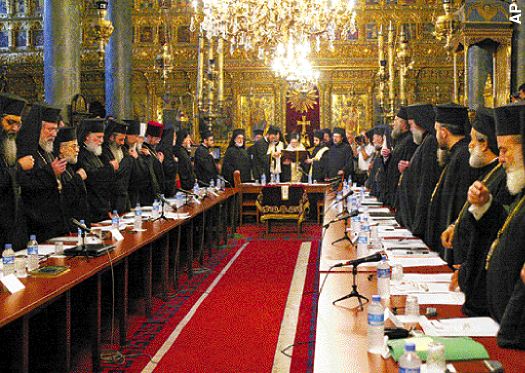The patriarch of Jerusalem has begun the process of electing a new patriarch, after pan-Orthodox synod convened in Instanbul accepted the decision of the Jerusalem synod to depose Patriarch Eirinaios. Eirinaios refuses to resign and is reportedly poised to challenge in the Israeli Supreme Court a 1958 Jordian law that governs the operation of the patriarchate.
“He is now the former patriarch of Jerusalem,” Ecumenical Patriarch Vartholomeos told journalists on May 24, after the eight-hour synod of the leaders and representatives of 11 of Orthodoxy’s 14 independent churches.
A statement by the synod noted that the delegations “decided to address a brotherly call to His Beatitude Patriarch Eirinaios of Jerusalem to voluntarily submit his resignation…With Patriarch Eirinaios refusing to accept this, the synod of church leaders accepted-with three abstentions – the majority decision of the Patriarch of Jerusalem Synod to denounce their patriarch, which entails his removal from the diptychs.” The diptychs are the list of recognized Orthodox Church leaders commemorated at church services.
Eight of the eleven churches represented voted for the decision to oust Eirinaios. The abstaining three (the Orthodox Churches of Antioch, George and Poland) signed the final communiqué, thus accepting its results.
As Eirinaios left the Patriarchal Church of St. George, where the synod was held, he was asked by the Athens News if he would resign. He waved his finger and said “never”.
He is reportedly considering challenging in the Israeli Supreme Court the force of 1958 Jordanian law by which he was elected and which governs the operation of the patriarchate. Many of the law’s provisions are not enforced. Eirinaios’ Greek lawyer, Alex Kouyias, stunned journalists when he declared that the Jordanian law on the patriarch has not been in force since Israel took Jerusalem in 1967.
The ousted patriarch did little to enhance his position with the other Orthodox Church leaders. He flatly accused Vartholomeos of bias against him and suggested that the ecumenical patriarch cede the synod presidency to the second-ranking Orthodox Church leader, Patriarch Theodoros of Alexandria.
The ecumenical patriarch is “first among equals”, with a canonically guaranteed right to coordinate the other independent churches in order to ensure Orthodox Christian unity.
Eirinaios also compared his own bishops’ denunciation of him with Turkey’s ultranationalist Grey Wolves, who recently burned Vartholomeos’ effigy outside the Ecumenical Patriarchate’s headquarters.
Vartholomeos’ meetings with other Orthodox leaders the day before the synod were instrumental in swaying the other delegations, whose church leaders were extremely concerned that the summary ouster of Eirinaios could set a dangerous precedent for their own positions. The Church of Cyprus delegation, led by Metropolitan Chrysostomos of Paphos, had deep reservations about the Jerusalem synod’s denunciation of its patriarch, because it was not done in a synod, as church canons demand, but rather by a petition circulated among bishops and priests. Chrysostomos angrily dismissed the denunciation text as “uncanonical”
UNHOLY CHURCH POLITICS
Ecumenical Patriarchate sources believe that the three churches that abstained from the vote to oust Eirinaios each had their own reasons for indirectly supporting Eirinaios. In the case of Georgia, there were allegations that a controversial archimandrite priest who used to serve in Jerusalem and is close to Eirinaios, Dionysios Kalabokas, used his influence with Georgian minister to nudge the Orthodox church of Georgia to support Eirinaios. The bishops who deposed Eirinaios also claimed that Eirinaios promised he would hand over control of Jerusalem’s historic Holy Cross monastery to the Georgians, who have long laid claim to it.
A key phanar cleric claimed that the Antiochian vote was a reaction to the Greek government’s demand for Eirinaios’ resignation. Antioch is said to fear Athens’ possible future interference in the succession of the aging Patriarch Ignatios.
But some of those who supported the ouster of Eirinaios are also believed to have been motivated by their own agenda and interest. The Patriarchate of Moscow, which has long sought an enhanced role in the Holy Land, found that Eirinaios had throughout his tenure forbidden the Russian exarch, or clerical envoy, to celebrate services outside the exarchy. Furthermore, Eirinaios was elected in 2001 over his chief rival, Metropolitan Timotheos of Vostra, who is considered a Russophile.
Ultimately, though, it was Ecumenical Patriarch Vartholomeos who set the tone for Eirinaios’ dismissal by the Instanbul synod. His introductory speech to the synod – which outlined charges that Eirinaios was authoritarian and avoided financial transparency – argued that there is a big difference between the pan-Orthodox synod independently toppling Eirinaios, and simply recognizing a decision already taken by Jerusalem church organs.
Sweeping aside canonical reservations expressed by scholars and churchmen over the decision by dissenting Jerusalem bishops to oust their patriarch by petition, Vartholomeos accepted the move as legitimate a priori, asserting that they “exercised their canonical right to depose the person they elected”. He noted that it was approved by King Abdullah of Jordan. Casting doubt on the process by which Eirinaios was elected in 2001. Vartholomeos argued that the synod vote to elect Eirinaios was not challenged in 2001 and so the vote to depose him should not be challenged now. “If we don’t accept the decision of the large majority of the synod to depose him, are we perhaps then challenging the self-rule of the Jerusalem Church?” Vartholomeos asked rhetorically.
“Regardless of whether Eirinaios is guilty, the fact is that the peace of the Jerusalem Church’s clergy and laity has been substantially disturbed, so it is patently obvious that peace cannot be restored without sacrifice,” he concluded.



